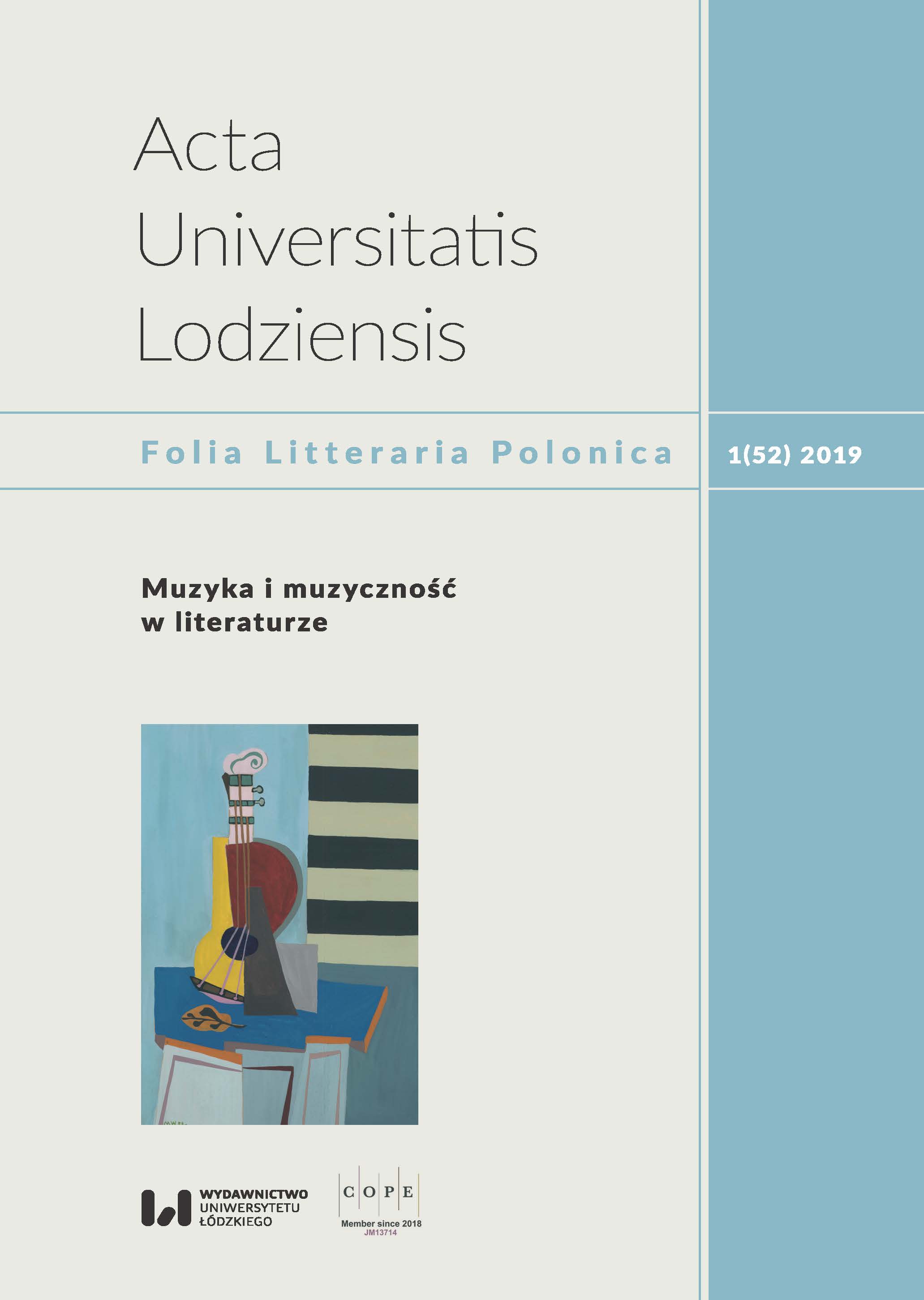Between vision and practice. The beginnings of German romantic opera from E.T.A. Hoffmann’s perspective
DOI:
https://doi.org/10.18778/1505-9057.52.23Keywords:
German Romanticism, Romantic Opera, E.T.A. Hoffmann, Undine, The Poet and the ComposerAbstract
This article is devoted to the theory of new German opera created by E.T.A Hoffmann and the first attempt to putting it into practice. His short story entitled The Poet and the Composer (1813) and released in the Leipzig “Allgemeine Musikalische Zeitung” is a romantic opera, written in two voices, which draws inspiration from the supernatural world and aims at a coherent poetic vision. E.T.A Hoffmann realised in Undine (1816) some of the postulates articulated in the analysed short story and in the correspondence from that time, using Friedrich de la Motte Fouqué’s libretto based on the fairy tale novella bearing the same title, thereby showing the way to further development of the genre.
Downloads
References
Fouqué Friedrich de la Motte, Notiz, „Die Musen. Eine norddeutsche Zeitschrift”, Berlin 1812, 4. Quartal, s. 198.
Google Scholar
Fouqué Friedrich de la Motte, Undine. Eine Zauberoper in drei Aufzügen, w: Wilhelm Pfeifer, Über Fouqués Undine. Nebst einem Anhange erhaltend Fouqués Operndichtung‚ Undine‘, C. Winter, Heidelberg 1903, s. 85–169.
Google Scholar
Fouqué Friedrich de la Motte, Undine. Eine Zauberoper in drei Aufzügen, w: E.T.A. Hoffmann, Werke 1814–1816, red. Hartmut Steinecke, Deutscher Klassiker Verlag, Frankfurt am Main 1988, s. 467–518.
Google Scholar
Heine Heinrich, Die romantische Schule, Hoffmann und Campe, Hamburg 1836.
Google Scholar
Hoffmann E.T.A., An die Redaktion der ‘Allgemeinen Musikalischen Zeitung’, w: E.T.A. Hoffmann, Frühe Prosa. Werke, Briefe, Tagebücher, Libretti, Juristische Schriften: Werke 1794–1813, red. Gerhard Allroggen i in., Deutscher Klassiker Verlag, Frankfurt am Main 2003, s. 224.
Google Scholar
Hoffmann E.T.A., Brief an Friedrich Baron de la Motte Fouqué vom 15. August 1812, w: E.T.A. Hoffmann, Frühe Prosa. Werke, Briefe, Tagebücher, Libretti, Juristische Schriften: Werke 1794–1813, red. Gerhard Allroggen i in., Deutscher Klassiker Verlag, Frankfurt am Main 2003, s. 252.
Google Scholar
Hoffmann E.T.A., Brief an Julius Eduard Hitzig vom 1. Juli 1812, w: E.T.A. Hoffmann, Frühe Prosa. Werke, Briefe, Tagebücher, Libretti, Juristische Schriften: Werke 1794–1813, red. Gerhard Allroggen i in., Deutscher Klassiker Verlag, Frankfurt am Main 2003, s. 246.
Google Scholar
Hoffmann E.T.A., Der Dichter und der Komponist, w: E.T.A. Hoffmann, Frühe Prosa. Werke, Briefe, Tagebücher, Libretti, Juristische Schriften: Werke 1794–1813, red. Gerhard Allroggen i in., Deutscher Klassiker Verlag, Frankfurt am Main 2003, s. 752–775.
Google Scholar
Honolka Kurt, Kulturgeschichte des Librettos. Opern – Dichter – Operndichter, Heinrichshofen, Wilhelmshaven 1979.
Google Scholar
Matt Peter von, Liebesverrat. Die Treulosen in der Literatur, Deutscher Taschenbuch Verlag, München 1999.
Google Scholar
Schreiber Ulrich, Opernführer für Fortgeschrittene. Die Geschichte des Musiktheaters. Das 19. Jahrhundert, Bärenreiter, Kassel 2008.
Google Scholar
Wagner Richard, Lohengrin, Peters Verlag, Leipzig 1850.
Google Scholar
Carl-Maria-von-Weber-Gesamtausgabe. Digitale Edition, http://weber-gesamtausgabe.de/A030013 [dostęp: 18.12.2016].
Google Scholar
Downloads
Published
How to Cite
Issue
Section
License

This work is licensed under a Creative Commons Attribution-NonCommercial-NoDerivatives 4.0 International License.











